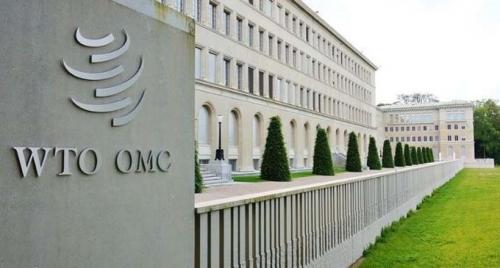The US vs the WTO and the multilateral order
The most important entity for preventing global trade wars is the WTO, without it the law of the strongest will prevail.
- Opinión

The international trade rules and the institutional bases of the world market have been shaken by the protectionist promotion of the “America First” policy of the second most important economy (CIA Factbook dixit). The declarations of the US President on the actions of the World Trade Organization (WTO) contradict the general purposes of the multilateral organization. The WTO has been the multilateral body, since 1995 charged with regulating international trade through the establishment of a non-binding normative framework, and of mechanisms for the solution of trade disputes among their 164 members.
Since the presidential campaign, Donald Trump has on various occasions mentioned the possibility of the US leaving the WTO, which recalls the US isolationism of the 1920s. Woodrow Wilson created the League of Nations in 1919 but never formally affiliated because the Republicans, led by Henry Cabot Lodge, thought “the League would commit the United States to an expensive organization that would reduce the United States’ ability to defend its own interests” [1]. The idea remains, hence the US position against the United Nations and their affiliated organizations.
According to the analyses of their ex-advisors Peter Navarro and Steve Bannon, and their present trade representative Robert Lighthizer, the WTO has permitted trade abuse of China towards the United States. Never mind that the US has won 90% of trade controversies promoted against them over the past 20 years. [2] Even being the greatest foreign investor in the world and the most important actor in international economic themes, the US maintains a ridiculous posture of the victim of the world market in general, and of China and Mexico in particular.
In mid-January of 2018, the US President announced a customs tariff of 20% for importing washing machines and 30% for solar panels. The decision corresponds to a direct retaliation against the Korean companies, LG and Samsung Electronics; the Chinese Suniva; and Mexican manufacture and exports.
Although the measure, in reality, is not sufficient, in itself, to destabilize the world economy, it violates the trade rules of the WTO and the spirit of free trade that the US has promoted since 1944, the policy of a free market imposed, in some cases, by the IMF and the World Bank, and anti-dumping norms. All to favor two American corporations: Whirlpool and Solar World Americas, Inc.
The consequences of this unilateral US decision could be disastrous. The economic signal that it sends to the world market expresses the project to re-write the trade rules in a unilateral way in favor of the US. Classic imperialism! In the internal economy, the protection of the big corporations and the macroeconomic effects that this generates, instead of reducing the trade deficit and promoting economic growth, will generate rising prices of protected products while it breaks small US companies in this field. All this will bring about a loss of jobs in related industries, such as the installation of solar panels. In the international context, the disdain the US shows towards the WTO and the multilateral institutions designed to maintain order and peace in the world market could open up a trade tariff war.
Against the unilateral US decision, China and South Korea can denounce the tariff increases in the WTO as unjust practices, disloyal measures of protection and dumping. Mexico can appeal the measure normatively by two routes: chapter 19 of NAFTA, which regulates customs measures, and the system of dispute resolution of the WTO. Nevertheless, respect for multilateral agreements does not appear to interest the US and the mechanisms of dispute resolution will therefore not come via multilateralism.
The message is clear: the WTO norms cannot regulate global trade relations if the US decides to promote protectionist policies against the free market. There the whole theory of international trade goes into the trashcan. With this logic, a scenario of trade conflicts is set off that deforms the structure and route of international trade, in which the most affected will be the least developed small economies.
The “America First” policy and the despotism with which the American government faces trade policy and the global multilateral order is in open opposition to the doctrine that the US itself imposed on the world in the 1990s, through the structural reforms promoted through the World Bank. Since the formulation of GATT (1947) to the establishment of the WTO (1994), the US sought to promote the dynamics of the international market and position itself as the rector of global trade rules. At present, the constant US aggression against multilateral institutions is leading to a situation of growing economic uncertainty and geopolitical tension. The most important entity for preventing global trade wars is the WTO, without it the law of the strongest will prevail.
15/02/2018
(Translated for ALAI by Jordan Bishop)
- Oscar Ugarteche, Coordinator of the OBELA Project, titular researcher of the Institute of Economic Investigation, UNAM, SNI/CONACYT.
- Armando Negrete, OBELA Project.
[1] https://history.state.gov/milestones/1914-1920/league
[2] https://www.factcheck.org/2017/10/trump-wrong-wto-record/
Del mismo autor
- El multilateralismo bipolar 08/03/2022
- Bipolar multilateralism 07/03/2022
- What does 2022 bring? Uncertainty 31/01/2022
- ¿Qué trae el 2022? Incertidumbre 31/01/2022
- The most expensive Christmas of the century... (so far) 20/01/2022
- La navidad más cara del siglo (hasta ahora) 20/01/2022
- Lo que pasó en el 2021 10/01/2022
- What happened in 2021 10/01/2022
- Estados Unidos: el elefante en la habitación 08/11/2021
- The elephant in the room 07/11/2021
Clasificado en
Clasificado en:
Libre Comercio
- José Ramón Cabañas Rodríguez 01/04/2022
- Jorge Murga Armas 31/03/2022
- Jorge Murga Armas 30/03/2022
- Lori Wallach 22/03/2022
- Néstor Araujo 22/03/2022
